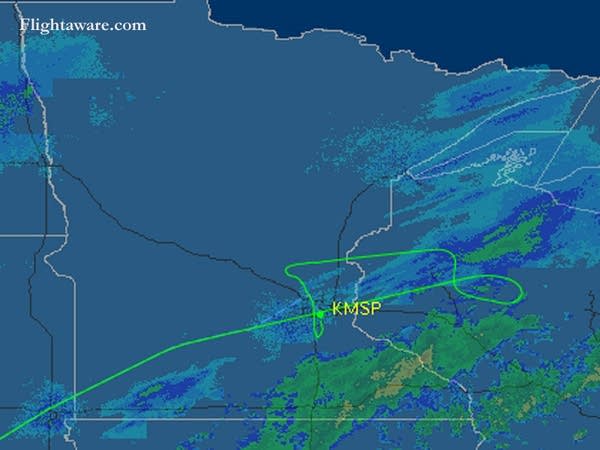Pilot denies fighting, sleeping in cockpit
Go Deeper.
Create an account or log in to save stories.
Like this?
Thanks for liking this story! We have added it to a list of your favorite stories.

The first officer of the Northwest Airlines jet that missed its destination by 150 miles says there was no disagreement in the cockpit, neither he nor the captain was napping and the passengers were never in any danger.
But in an interview with The Associated Press two days after he and a colleague blew past their destination as air traffic controllers tried frantically to reach them, pilot Richard Cole would not say just what it was that led to them to forget to land Flight 188.
"We were not asleep; we were not having an argument; we were not having a fight," Cole told the AP.
Air traffic controllers and pilots tried for more than an hour Wednesday night to contact Cole and the flight's captain, Timothy B. Cheney, of Gig Harbor, Wash., using radio, cell phone and data messages. On the ground, concerned officials alerted National Guard jets to prepare to chase the airliner from two locations, though none of the military planes left the runway.
Turn Up Your Support
MPR News helps you turn down the noise and build shared understanding. Turn up your support for this public resource and keep trusted journalism accessible to all.
"It was not a serious event, from a safety issue," Cole said in front of his Salem, Ore., home. "I would tell you more, but I've already told you way too much."
Unfortunately, the cockpit voice recorder may not tell the tale.

New recorders retain as much as two hours of cockpit conversation and other noise, but the older model aboard Northwest's Flight 188 includes just the last 30 minutes - only the very end of Wednesday night's flight after the pilots realized their error over Wisconsin and were heading back to Minneapolis.
Cole would not discuss why it took so long for the pilots to respond to radio calls, "but I can tell you that airplanes lose contact with the ground people all the time. It happens. Sometimes they get together right away; sometimes it takes awhile before one or the other notices that they are not in contact."
A police report released Friday said the pilots passed breathalyzer tests and were apologetic after the flight. Cheney and Cole had just started their work week and were coming off a 19-hour layover, the Minneapolis Star Tribune reported Saturday, citing an internal Northwest document it said was described to the newspaper.
The police report said that the crew indicated they had been having a heated discussion about airline policy.
But aviation safety experts and other pilots were deeply skeptical they could have become so distracted by shop talk that they forgot to land an airplane carrying 144 passengers. The most likely possibility, they said, is that the pilots simply fell asleep somewhere along their route from San Diego.
"It certainly is a plausible explanation," said Bill Voss, president of the Flight Safety Foundation in Alexandria, Va.

Cheney and Cole have been suspended and are to be interviewed by National Transportation Safety Board investigators next week. The airline, acquired last year by Delta Air Lines, is also investigating. Messages left at Cheney's home were not returned.
FAA spokesman Tony Molinaro said in general, an unsafe condition created by a pilot could lead to the suspension of the person's pilot license and possibly a civil penalty.
With worries about terrorists still high, even after contact was re-established, air traffic controllers asked the crew to prove who they were by executing turns.
"Controllers have a heightened sense of vigilance when we're not able to talk to an aircraft. That's the reality post-9/11," said Doug Church, a spokesman for the National Air Traffic Controllers Association.
NTSB spokesman Keith Holloway said fatigue and cockpit distraction will be looked into. The plane's flight recorders were brought to the board's Washington headquarters.
The pilots were finally alerted to their situation when a flight attendant called on an intercom from the cabin.
Voss said a special concern was that the many safety checks built into the aviation system to prevent incidents like this one - or to correct them quickly - apparently were ineffective until the very end. Not only couldn't air traffic controllers and other pilots raise the Northwest pilots for an hour, but the airline's dispatcher should have been trying to reach them as well. The three flight attendants onboard should have questioned why there were no preparations for landing being made. Brightly lit cockpit displays should have warned the pilots it was time to land.
"It's probably something you would say never would happen if this hadn't just happened," Voss said.




